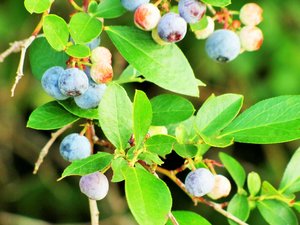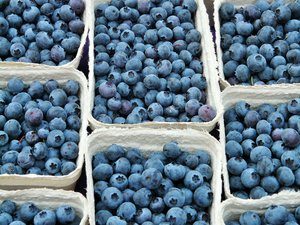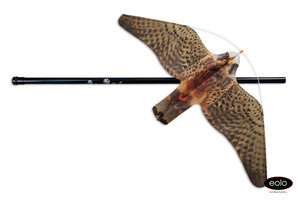In this article, we present the main findings of the Cornell University report on the issue of birds as the primary pest in blueberry crops. We also discuss the effectiveness of different solutions to repel birds in blueberry plantations.
Anticipating a Strong Increase in Blueberry Production

Based on strong consumer demand, global blueberry production is expected to double in the next five years.
The United States is the largest blueberry producer in the world, followed by Canada. However, a significant portion of this substantial increase in blueberry production will come from Europe, specifically countries such as Poland, Germany, and the Netherlands, as well as Spain, Portugal, and France.
In recent years, new blueberry producers have emerged in these countries, and this trend is only going to continue. This is evidenced by the establishment of associations and dedicated conferences for blueberry producers, such as the annual “Encontro Nacional de Produtores de Mirtilo” in Portugal. In Spain, the majority of blueberry production comes from Huelva, but new producers have also emerged in Galicia and other parts of northern Spain.
Pursuing Profitability in Cultivation

Like any other business, the primary goal for blueberry producers is to make their plantations profitable. To achieve this, they need detailed information on blueberry production and marketing to conduct proper financial analysis of their crops.
Cornell University Report on Bird Pests in Crops
In this article, we summarize the main findings of a report from the Department of Horticulture – College of Agriculture – at Cornell University (United States) on the issue of birds as one of the main pests in blueberry, strawberry, and grape crops. You can download the full report at www.fruit.cornell.edu.
According to this report, nearly 30% of blueberry harvest in the northern United States and 10% of the overall geography in North America is lost due to birds. This results in losses of approximately 10 million dollars!
Effectiveness of Different Solutions to Repel Birds in Blueberry Plantations
Wildlife specialists at the university have analyzed the effectiveness of different solutions for bird deterrents in blueberry and cherry plantations, and they have reached the following conclusions:
- Bird netting – It is expensive and difficult to install.
- Chemical repellents – based on methyl anthranilate – Its taste prevents birds from eating the fruit. However, being a volatile compound, it has a very short effectiveness. Good results were achieved for about three days, but after this period, these chemical repellents lose their effectiveness. It is necessary to reapply them four times during the season and after rainy days, which increases the cost of treatment.
- Scare cannons – They are effective only for short periods of time. They need to be regularly repositioned and supplemented with other visual bird deterrents.
- Bioacoustic bird repellers “Bird Gard” – They emit digitized sounds of distress calls of bird species to be deterred, along with predator sounds like a hawk. These sounds are emitted randomly. The report concludes that there was a reduction in crop losses by using bioacoustic bird deterrents in blueberry plantations. The report also notes that when the Bird Gard bird deterrents were discontinued, bird populations increased dramatically.
- Visual bird repellers – One blueberry producer interviewed reported the effectiveness of owl replicas, which are mounted on a pole and allowed to rotate with the slightest breeze.
Protecting Blueberry Crops from Birds – Study Conclusions
The most effective solutions to repel birds in blueberry plantations are based on a combination of bioacustic and visual bird repellers.
BirdGard Iberia Experience against Thrushes, Starlings, and Blackbirds in Blueberry Crops
Just last year, BirdGard Iberia distributed bird deterrent solutions to more than thirty blueberry plantations in Spain and Portugal.
These solutions were primarily based on bioacustic bird repellers from the Bird Gard Pro Plus and Bird Gard Super Pro models.
These bird repellers were configured with chip #61 – which is specific to thrushes, starlings, and blackbirds. Thrushes, starlings, and blackbirds are the bird species that typically cause the most problems in blueberry plantations.
In many cases, these sound bird deterrents were complemented with visual bird repellers, mainly with the hawk kite scarecrow.


At BirdGard Iberia, we are proud to be able to contribute to solving one of the main problems in blueberry production: the issue of birds. And to increase the profitability of these crops.
Below we list some customer references, who use Bird Gard repellers to scare off flocks of thrushes, starlings, and blackbirds:
- The article “The Government of La Rioja acquires Bird Gard bioacustic repellers for bird control” explains the reference of the Government of La Rioja using BirdGard bioacustic bird repellers in experimental blueberry and other berry fruit plantations.
- Dr. Martínez, Director of the Viticulture Group at CSIC (Spanish National Research Council), shares her experience with different methods to repel birds in vineyards.
- José Luis López Budia, a farmer in Cifuentes, explains how he has managed to protect his almond trees from woodpecker attacks and his cherry trees from flocks of thrushes.
- Bird deterrents used to minimize micro power outages caused by flocks of starlings on power lines. Reference: Iberdrola.
- If you have any questions about the type of birds attacking your crops, we recommend reading the article “Differences between Starlings, and Blackbirds: How to Repel them.”
If you are also experiencing bird problems in your crops, don’t hesitate to contact us. One of our experts will provide you with free advice on the most effective solution for your case.
